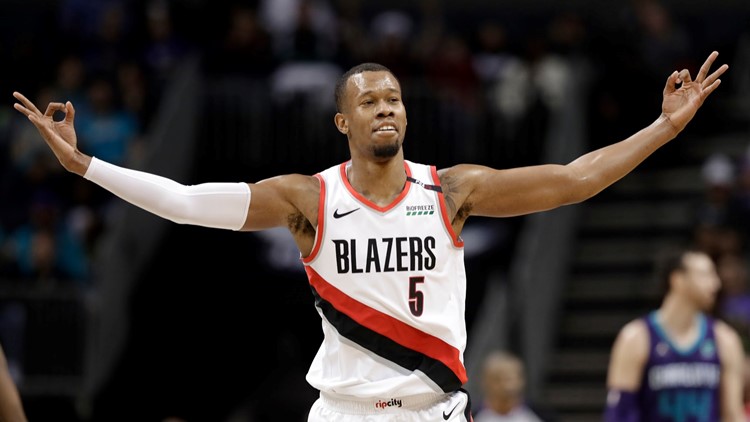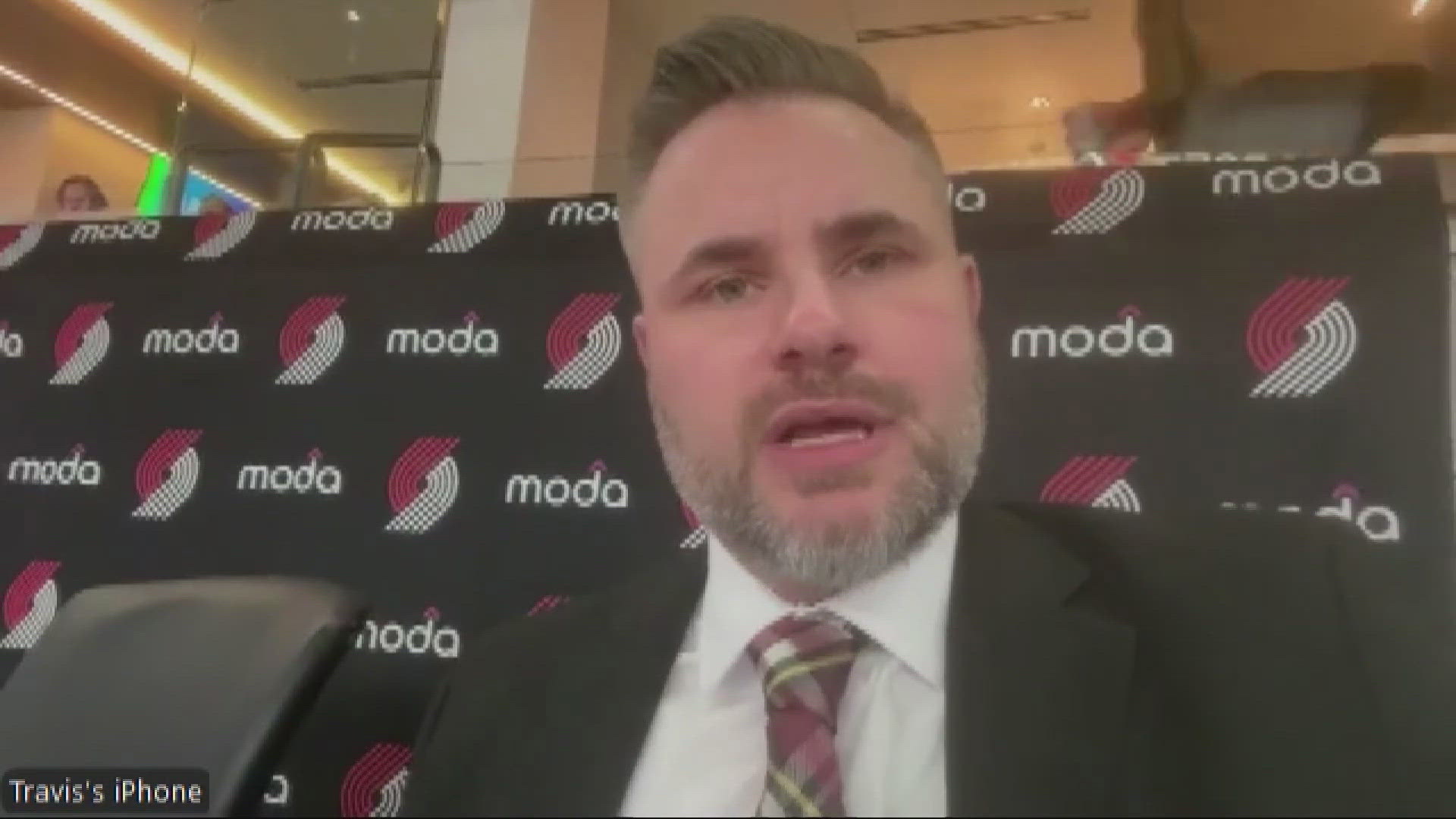PORTLAND, Ore. — During a 22-point loss to the defending champs in Game 1 of the Western Conference finals, a lot went wrong for the Portland Trail Blazers.
Looking at most of the coverage the next day, it seems all anyone wanted to talk about or write about was how thoroughly the Blazers' defensive scheme failed against Stephen Curry and the Warriors. But focusing so much on the Blazers' defense ignores the real reason they lost Game 1: their offense.
Curry certainly did go off against Portland, hitting nine 3-pointers on his way to 36 points. Portland decided to drop its big men in the pick-and-roll, which allowed Curry to come off screens and rise up for a ton of open 3-point looks. Eleven of Curry's 15 3-point attempts were open, with no defender within four feet. Seven of his nine makes on the night were open.
(Story continues below)
3-on-3 Blazers podcast
Listen to the most recent edition of the 3-on-3 Blazers podcast
- on Apple podcasts/iTunes
- on Podbean
- on SoundCloud
- on Stitcher
- on Google Play
Blazers coach Terry Stotts, who offered a terse response to a question from The Athletic's Anthony Slater about the Blazers' defensive scheme after Game 1, apologized to Slater on Wednesday for his sarcastic answer, and acknowledged he needs to rethink his pick-and-roll coverages against the Warriors.
That's good. Stotts has shown the ability to make sound adjustments both during and between games so far in these playoffs — look at Game 2 and Game 7 of the Denver series — and I expect we'll see some changes in Game 2 of the conference finals.
But focusing so much on the Blazers defense seems to be missing the point, in my opinion. It's not like Portland, or any team in the NBA, has many viable schemes to slow the Warriors. Whatever defense the Blazers employ, the Warriors are probably going to score a lot and hit a lot of 3-pointers. That's what the Warriors do. They're a dominant offensive team for which there are few answers.
Warriors coach Steve Kerr said as much Wednesday.
"Nothing surprised us about last night. You're talking about Steph Curry, a guy who's done this — I mean, he had 33 in the second half against Houston the other night," Kerry said. "Sometimes the schemes don't matter."
The Blazers employ the defensive scheme they do because it's what works best for them. It fits their personnel, it's what they practice, and it's what they're familiar with. Stotts can, and should, make some adjustments to the scheme and throw a few different looks at the Warriors. But he shouldn't change the scheme altogether. No matter what adjustments are made, odds are the Warriors will continue to score.
(Story continues below)
Western Conference finals at a glance
(1) Golden State Warriors vs. (3) Portland Trail Blazers
Warriors lead best-of-7 series, 1-0; all times PDT
- Game 1 (at GS): Warriors 116, Trail Blazers 94
- Game 2 (at GS): Thursday, 6 p.m., ESPN
- Game 3 (at POR): Saturday, 6 p.m., ESPN
- Game 4 (at POR): Monday, May 20, 6 p.m., ESPN
- x-Game 5 (at GS): Wednesday, May 22, 6 p.m., ESPN
- x-Game 6 (at POR): Friday, May 24, 6 p.m., ESPN
- x-Game 7 (at GS): Sunday, May 26, 6 p.m., ESPN
x-if necessary
Whatever defensive adjustments Stotts makes or doesn't make, I still feel like we're so focused on the Blazers' defense in Game 1, that we're ignoring the real reason they lost the first game in Oakland: their offense.
The Blazers shot 36% from the field. They shot 25% from the 3-point line. Portland's star backcourt — Damian Lillard (19 points, 4 for 12 from the field, 7 turnovers) and CJ McCollum (17 points, 7 of 19 from the field, 1 of 5 from 3) — were straight-up bad, and were outplayed by Curry and Klay Thompson. The Blazers were SLOPPY, turning the ball over 21 times, which led to 31 points for the Warriors.
That's why Portland lost. It doesn't matter what kind of defense the Blazers play if their offense is that bad. If the Blazers want a shot at winning Game 2 and bringing a 1-1 series back to Portland, their biggest adjustments will need to come on the offensive side of the ball.
The biggest offensive adjustment the Blazers could make is to move Rodney Hood into the starting lineup. Hood was one of the few bright spots in Game 1, and has been the Blazers' third- or fourth-best player since the start of the second round.
During that eight-game stretch, Hood has averaged 15.0 points and 3.1 rebounds in 25.6 minutes per game, while shooting 56.7% from the field and 48.1% from the 3-point line. In that same time frame, Al-Farouq Aminu has averaged 6.8 points and 6.5 rebounds in 25.9 minutes per game, and is shooting 32.1% from the field and 20.8% from the 3-point line. Maurice Harkless, in 21.6 minutes per game, has averaged 7.0 points and 4.0 rebounds, shooting 46.9% from the field and 21.4% from the 3-point line.
I'd keep Harkless in the starting lineup for now, which would allow the Blazers to switch defensive roles so he's the primary defender on Curry, much like we saw after Game 1 of the second-round series against the Nuggets, when Harkless was moved onto Jamal Murray. Lillard was Curry's primary defender in Game 1, but he died on too many screens, which allowed Curry to take advantage of the Blazers' conservative defensive scheme. Harkless is better at maneuvering through screens than Lillard, and has more length to contest, which could reduce the number of open looks Curry gets from 3.
That pushes Aminu to the bench. His minutes have already been dropping as the Blazers have advanced deeper into the playoffs. After averaging 32.2 minutes through the first nine games of the playoffs, Aminu has averaged just 16.6 minutes per game over the past four, during which he's averaged 4.0 points, 3.5 rebounds and shot the ball poorly. Those minutes have been given mostly to Hood, who has averaged 26.0 minutes over the past four games, and Zach Collins, who has averaged 22.8 minutes over the same time frame.
The Warriors' defense in Game 1 was reminiscent of the Pelicans' scheme last season, where Lillard saw two and three defenders at every turn. It's never been more important to surround Lillard with offensive talent on the wing. Harkless showed well in Game 1, with an active 17 points, so keep him in the lineup with Lillard, and see if he can make a difference defensively against Curry. Hood is already playing the fourth-most minutes on the team over the past four games, so the Blazers should just make the change official, move him into the starting lineup, and give him as many minutes as he can handle.
In Game 1, the starting lineup of Lillard, McCollum, Harkless, Aminu and Kanter played the most minutes of any Blazers five-man unit, and were outscored by 11.9 points per 100 possessions. But the third most-used five-man unit was the same group but with Hood in place of Aminu. Together, that group outscored the Warriors by 9.1 points per 100 possessions. It was one of only *two five-man units with a positive net rating in Game 1.
Make that group the starting lineup in Game 2, and see if that can help free up some space for Lillard and McCollum and get the offense humming again. A good offense is the best chance for the Blazers to make any noise against the Warriors.
Jared Cowley writes about the Trail Blazers and other topics for KGW.com. He's also the co-host of the 3-on-3 Blazers podcast (listen here). You can reach him on Twitter @jaredcowley.
* The other unit with a positive net rating? Evan Turner, Lillard, Seth Curry, Hood and Collins, who outscored the Warriors by 50 points per 100 possessions.



